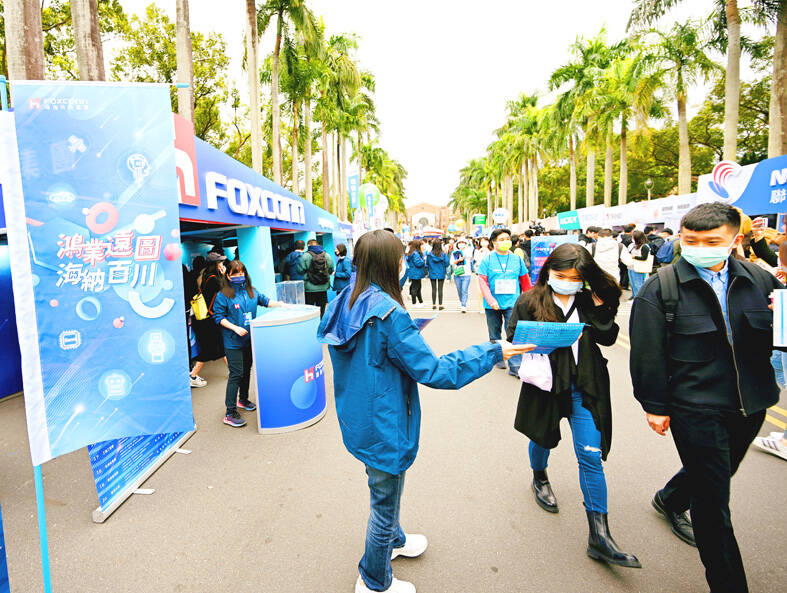Hon Hai Precision Industry Co (鴻海精密) yesterday reported a month-on-month revenue decrease of 39.12 percent to NT$402.04 billion (US$13.13 billion) last month, the lowest in 16 months.
On an annual basis, the company, which is globally known as Foxconn Technology Group (富士康科技集團), posted a 11.65 percent revenue decline, it said.
Last month’s revenue was the lowest since August 2021, when the firm reported NT$400.05 billion in revenue.

Photo: Fang Pin-chao, Taipei Times
However, it was also the second-best February performance in the company’s history, the iPhone assembler said in a statement.
February last year ranked the highest for the same period, with NT$455.03 billion in revenue, it said.
The world’s biggest contract electronics maker attributed last month’s revenue decrease to a lackluster performance across its four major business groups: smart consumer electronics, cloud and networking technology, computing products, and components and other products.
Smart consumer electronics, cloud and networking technology, and computing products all posted lower sales last month due to slowing pull-in orders from customers, and a relatively high comparison base last year, while sales of components and other products posted a relatively flat performance, Hon Hai said.
The company’s production lines in Zhengzhou — Apple Inc’s key manufacturing hub in China — had returned to normal operations in January, following disruptions from a COVID-19 outbreak late last year, it said
The first-quarter outlook is “roughly in line with market expectation,” Hon Hai said, based on revenue performance over the past two months.
Hon Hai’s consolidated revenue in the first two months of this year was NT$1.06 trillion, up 17.94 percent from NT$900.78 billion a year earlier, which is the highest January-to-February figure in the company’s history, it said.
The sales data come as the company is planning new investments in India following Hon Hai chairman Young Liu’s (劉揚偉) visit to the country last week.
Indian Karnataka State Chief Minister Basavaraj Somappa Bommai wrote on Twitter on Friday last week that Apple would “soon” manufacture iPhones at a new plant in the state, creating “about 100,000 jobs,” while Bloomberg News reported that Hon Hai was planning to invest US$700 million in a new factory in Karnataka, citing unnamed sources.
No deals had been finalized during Liu’s visit, and financial investment sums discussed in the media had not been officially released, Hon Hai said in a statement on Saturday.
Separately, Hon Hai joined more than 300 companies at a job fair at National Taiwan University on Saturday, as the firm seeks to hire recent graduates for its electric vehicle, digital healthcare, robotics, artificial intelligence, semiconductor and IC design businesses.

Taiwan’s technology protection rules prohibits Taiwan Semiconductor Manufacturing Co (TSMC, 台積電) from producing 2-nanometer chips abroad, so the company must keep its most cutting-edge technology at home, Minister of Economic Affairs J.W. Kuo (郭智輝) said yesterday. Kuo made the remarks in response to concerns that TSMC might be forced to produce advanced 2-nanometer chips at its fabs in Arizona ahead of schedule after former US president Donald Trump was re-elected as the next US president on Tuesday. “Since Taiwan has related regulations to protect its own technologies, TSMC cannot produce 2-nanometer chips overseas currently,” Kuo said at a meeting of the legislature’s

TECH WAR CONTINUES: The suspension of TSMC AI chips and GPUs would be a heavy blow to China’s chip designers and would affect its competitive edge Taiwan Semiconductor Manufacturing Co (TSMC, 台積電), the world’s biggest contract chipmaker, is reportedly to halt supply of artificial intelligence (AI) chips and graphics processing units (GPUs) made on 7-nanometer or more advanced process technologies from next week in order to comply with US Department of Commerce rules. TSMC has sent e-mails to its Chinese AI customers, informing them about the suspension starting on Monday, Chinese online news outlet Ijiwei.com (愛集微) reported yesterday. The US Department of Commerce has not formally unveiled further semiconductor measures against China yet. “TSMC does not comment on market rumors. TSMC is a law-abiding company and we are

FLEXIBLE: Taiwan can develop its own ground station equipment, and has highly competitive manufacturers and suppliers with diversified production, the MOEA said The Ministry of Economic Affairs (MOEA) yesterday disputed reports that suppliers to US-based Space Exploration Technologies Corp (SpaceX) had been asked to move production out of Taiwan. Reuters had reported on Tuesday last week that Elon Musk-owned SpaceX had asked their manufacturers to produce outside of Taiwan given geopolitical risks and that at least one Taiwanese supplier had been pushed to relocate production to Vietnam. SpaceX’s requests place a renewed focus on the contentious relationship Musk has had with Taiwan, especially after he said last year that Taiwan is an “integral part” of China, sparking sharp criticism from Taiwanese authorities. The ministry said

US President Joe Biden’s administration is racing to complete CHIPS and Science Act agreements with companies such as Intel Corp and Samsung Electronics Co, aiming to shore up one of its signature initiatives before US president-elect Donald Trump enters the White House. The US Department of Commerce has allocated more than 90 percent of the US$39 billion in grants under the act, a landmark law enacted in 2022 designed to rebuild the domestic chip industry. However, the agency has only announced one binding agreement so far. The next two months would prove critical for more than 20 companies still in the process